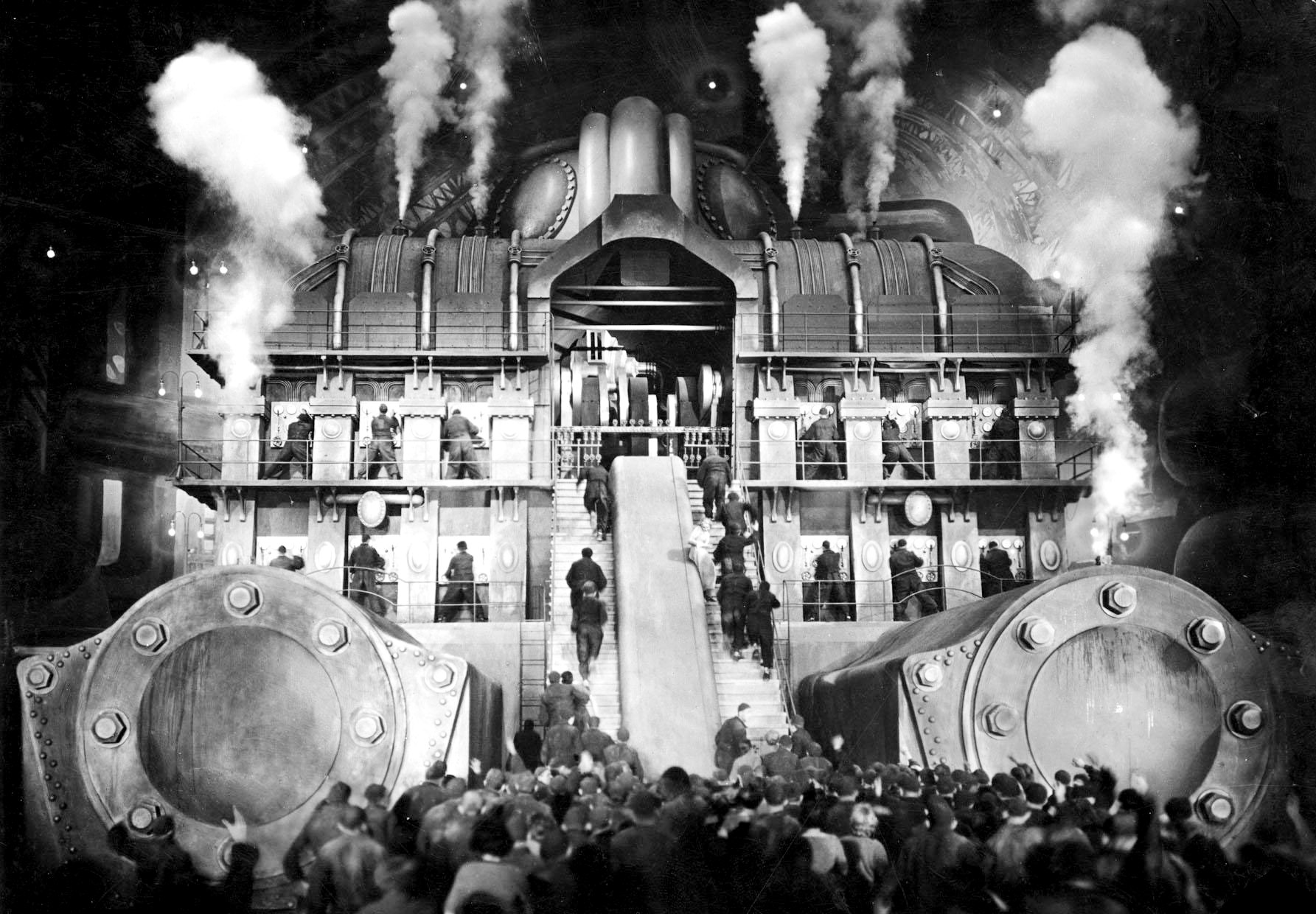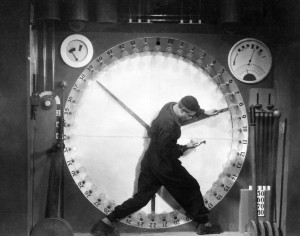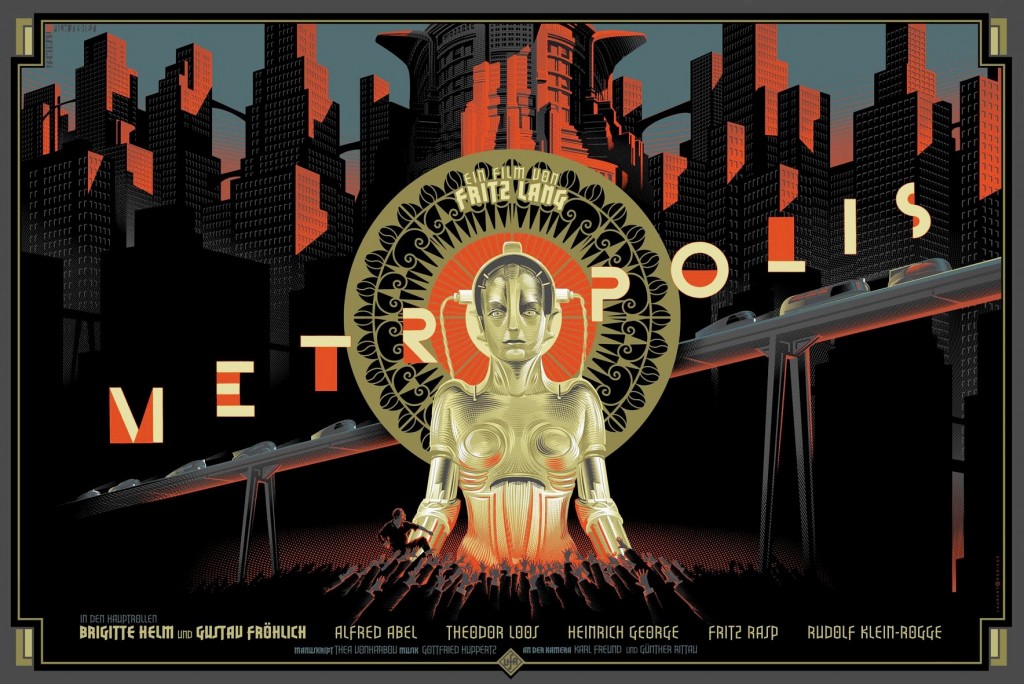
“Motion pictures and weapons of war: science has created them both. So while others point guns, I’ll have my camera, offering fantastic dreams of other worlds just beyond our reach.” – Director Fritz Lang
Nothing matches the grandiosity and blind ambition of this film during its time. Metropolis (1927, Germany) is a cornerstone of sci-fi cinema and is one of the most lasting influential films in history. The Fritz Lang black & white silent film is a descendant of a hundred modern day science fiction films, most notably “Blade Runner,” “Dark City,” “The Matrix,” “A.I.,” and “Minority Report.” When other films borrow from “The Matrix” for instance, what they’re really imitating is “Metropolis” whether contemporary filmmakers are conscious of it (The Wachowski’s who made “The Matrix” admit the “Metropolis” influence). The futuristic story of exploited underground workers activating an uprising against the capitalists that live above ground in a magnificent skyscraper city, remains an enthralling one.
There are more title cards that contain dialogue than other most others for its time, and the speech mimicry is a bit slow in relation to communicating the plot than our fast-cutting films today. But in a woozy mood, “Metropolis” can hold you spellbound. It gets very fast-moving anyway by the second half. The stylized sets are always astonishing to look at, and tell more of the story than the title cards do at times. The most expensive film ever made for its time, it cost $7 million Reichmarks, which would be equivalent to $200 million today. (At nickel and dime box office ticket prices it had trouble making its money back.)
Gustav Frohlich plays the spoiled aristocrat Freder who has lived a charmed, stress-free life. Alfred Abel plays the industrialist father who has kept his son away from the truth about the slave-wagers he exploits. Brigitte Helm plays Maria, the love interest who urges Freder to acknowledge the sick class disparity. Freder goes down to the subterranean cavern to see overdriven workers stagger through dangerous conditions. Freder is startled to learn that the rich live blissfully only because the lower classes, inhabiting in an underground city, grind through demoralized labor.
 Since Freder has lived a toil-free life, he decides to work a 10-hour day to gain empathy of a worker’s life. He can hardly sustain himself through an entire shift. As an amends, he shows his fellow workers there is a more meaningful life above the city’s surface. This, of course, leads to an uprising also spearheaded by Maria who riles the crowd. The tycoons do what they can to flood and destroy the lower depths to suppress the insurgency. There is also intrigue with a mad scientist named Rotwang who has created a robot, or replicant (think “Blade Runner”), who is a doppelganger of Maria that the evil industrialists use to fool the underground revolt. Viewers out there who love city destruction chaos will love this stuff.
Since Freder has lived a toil-free life, he decides to work a 10-hour day to gain empathy of a worker’s life. He can hardly sustain himself through an entire shift. As an amends, he shows his fellow workers there is a more meaningful life above the city’s surface. This, of course, leads to an uprising also spearheaded by Maria who riles the crowd. The tycoons do what they can to flood and destroy the lower depths to suppress the insurgency. There is also intrigue with a mad scientist named Rotwang who has created a robot, or replicant (think “Blade Runner”), who is a doppelganger of Maria that the evil industrialists use to fool the underground revolt. Viewers out there who love city destruction chaos will love this stuff.
The German Expressionist weirdness compensates for some of the more illogical facets – how do those machines really work? “Metropolis” was deliberately over-stylized by Lang for dramatic effect. Lang created special effects to simulate electrodes and elevated transportation (consider the similarity of commercial consumer vehicles in “Minority Report”), used real spouting flames in proximity to the cast, ran hundreds of extras through hazardous mechanical-operated gates, and goaded his actors to jump from high places. Lang’s career would flourish into the sound era with such titles as “M” (1931) and “The Big Heat” (1953).
This however is the Lang film that will be met with awe and admiration by viewers for another two hundred years to come. Grand, marvelous, bizarre – these traits are part of a watershed film that revolutionized Hollywood. Even if it came from Germany. In fact, it impressed Adolph Hitler and Joseph Goebbels enough that aesthetic elements inspired Nazi propaganda.
There have been several edited versions over the years. The earliest DVD release had a 124 minute running time, there was also 1984 edition scored with rock music by Giorgio Morodor that ran at a deliberately compressed 82 minutes, and then miraculously the restored 2010 edition which added a half hour of long lost footage. See any version, but go with the restored cut if you love dwelling in extra outlandish avante-garde imagery.
153 Minutes (Restored Version). Unrated.
SCI-FI & FANTASY / MIND-BENDER / WEEKEND TRANCE-OUT
Film Cousins: “Blade Runner” (1982); “Dark City” (1998); “The Matrix” (1999); “A.I.” (2001); “Minority Report” (2002); “Elysium” (2013).





